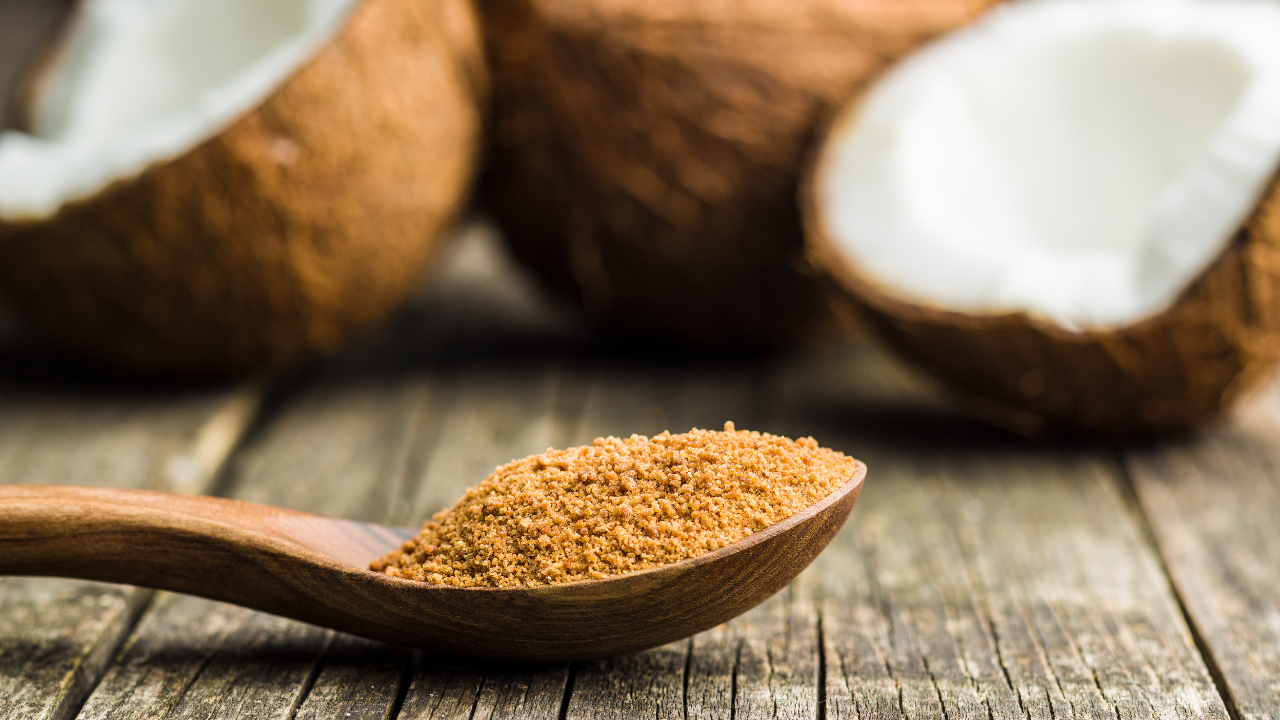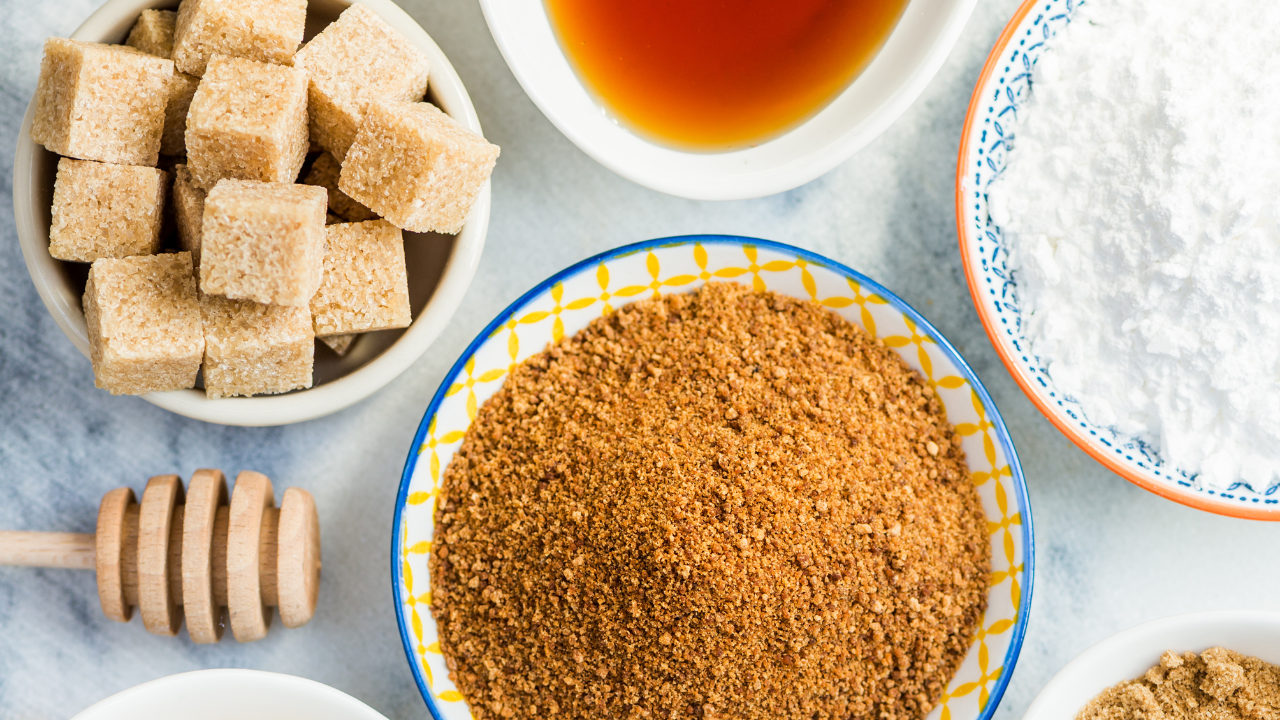Is Coconut Sugar Healthier For You?
DISCLAIMER: Links included in this blog might be affiliate links. Health with Hannah, LLC is a participant in the Amazon Services LLC Associates Program along with other affiliate programs. If you purchase a product or service with the links that I provide I may receive a small commission with no additional charge to you. Thank you for your support!
With growing concern about the amount of sugar being consumed, many people are looking for alternatives. Coconut sugar is a popular option that is commercially available. But is coconut actually healthier for you than regular sugar?
Table of contents:
What is coconut sugar?
Coconut sugar is a type of sweetener made from the sap of the coconut tree. Coconut sugar has a tan color and a slightly caramelized taste compared to white table sugar. Coconut sugar looks similar to raw cane sugar, which makes sense as they are processed in similar fashions.
Coconut sugar is thought to have originated in Southeast Asia and is now available in most grocery stores.
Are there any health benefits to coconut sugar?
Many people have switched to coconut sugar thinking it is the healthier choice, but the truth is that coconut sugar is really not all that different from table sugar. There are a few slight variations between the two.
Slightly lower glycemic index
The glycemic index is a scale that measures how quickly a food will raise our blood sugar. Foods can be ranked from zero to 100. Typically (but not always), foods with high glycemic index are low in fiber and higher in simple carbohydrates and will raise blood sugar faster. Foods lower on the glycemic index are usually higher in protein, fat, and/or fiber and have a lesser effect on blood sugar.
Keep in mind that a high glycemic index is not equivalent to “unhealthy” and low glycemic index foods are not automatically the “healthier” choice. There are many other factors that can (and should) be considered when determining the healthfulness of a food choice. Plus, the glycemic index is really only accurate when we eat that food alone on an empty stomach, which is not typically how we consume food.
For most people, the glycemic index is not something to be overly concerned about on its own. Instead, I generally recommend eating balanced, consistent meals and snacks to help stabilize blood sugars.
All that said, coconut sugar does have a slightly lower glycemic index than cane sugar/table sugar. Coconut sugar’s glycemic index typically runs around 50-54, while table sugar is around 60-65. Once again, you likely are not eating sugar of any kind on its own but rather as part of a dish or beverage in combination with other foods and nutrients.
Related post: Managing Your Diabetes with Intuitive Eating
Trace amounts of vitamins and minerals
Coconut sugar has small amounts of minerals, including magnesium, iron, potassium, zinc, and some B vitamins. However, you would need to eat very large amounts of coconut sugar to obtain any beneficial amount of these nutrients. Otherwise, coconut sugar is mainly composed of carbohydrates, just like table sugar.
Is coconut sugar a natural sweetener?
Advocates of making the swap to coconut sugar will claim they do so because coconut sugar is a “natural” alternative to refined table sugar, making it the healthier choice.
The term “natural” is not regulated in the food industry. This means that any company can slap the term on their product’s label. That said, most people interpret the term to mean that the food is as close to its natural form as possible.
Coconut sugar is considered to be a natural sweetener. However, our body ultimately views both natural sweeteners and refined sweeteners nearly the same. All of them will be broken down into glucose or fructose in the digestive process.
Related post: Why I Recommend Processed Foods as a Dietitian
How does coconut sugar compare to other sugar alternatives?
Price
When compared to table sugar and brown sugar, coconut sugar tends to be more expensive. This may partially be related to the hype around it and the “health halo” that it has. Ultimately though, coconut sugar is pricier due to the labor and resources required to produce it.
Quick reminder - just because something is more expensive, this does not automatically mean that it is “healthier”.
Taste
Coconut sugar has a caramel flavor that differs from white table sugar. If you enjoy this flavor profile, you may also like these sweeteners:
Brown sugar
Honey
Agave
Maple syrup
Unlike some sweeteners, coconut sugar can typically be used as a 1:1 swap in recipes.
Calories and sugar content
If you are interested in a low-calorie sugar substitute, coconut sugar would not be the swap to make. Coconut sugar has the same carbohydrate and calorie content as table sugar and is not considered a low-calorie food. Check out this post to learn about non-nutritive sweeteners.
Does coconut sugar count as added sugar?
When reading a nutrition facts label on a food product, your eyes may be drawn to the “added sugar” section. This number indicates how many grams of sugar are added to the food or drink beyond the naturally occurring carbohydrates.
All types of sweeteners (aside from artificial sweeteners) count as “added sugar”. This includes coconut sugar along with honey, agave, cane sugar, etc.
I have also seen people claim to avoid added sugars or they participate in “sugar detoxes” yet they include sweeteners such as coconut sugar in their diet. There is nothing wrong with using coconut sugar (or other sweeteners), but technically they would not be following the "no added sugar” diet that they think they are.
Bottom line - is coconut sugar good for you?
At the end of the day, coconut sugar offers little nutritional benefit compared to regular table sugar. It does have a different flavor profile and some people may choose to use it in different applications for this reason.
Choose the sweetener that you enjoy, makes sense in your budget, and fits within your unique nutrition needs.
What did you think of this post? Leave a comment below.
Disclaimer: this post is for informational and educational purposes only and is not a substitute for professional medical advice.

































